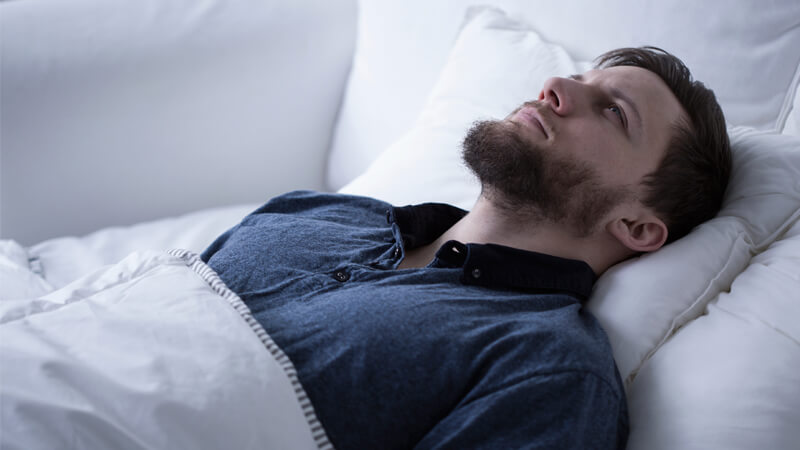6 Natural Ways To Combat Restless Sleeping

Sleeping isn't always the first thing on the to-do list for busy people. With hectic work schedules, taking care of children, meetings, committees, and deadlines, the average adult only gets about 6 hours and 40 minutes of sleep each night. The recommended amount of sleep is 7 to 9 hours a night, but it just seems unrealistic when considering all the things that need to get done during the day. Over the counter sleep medications can prove to be helpful occasionally. They could leave you feeling groggy even after a full night's sleep. Over the counter sleep medications can even cause dizziness, blurry vision, and even forgetfulness. Instead of relying on these types of medications, there are plenty of natural remedies to help combat a restless sleep.
1. Lavender
The scent of lavender is said to ease anxieties along with restless sleep. Lavender is a purple flower that can grow in almost all sunny environments, including the United States. The flower is used extremely often in aromatherapy, the process of inhaling essential oils and other aromatic products in order to benefit someone's current mood or overall health. When used for treating restless sleep, lavender can also be consumed. This is usually done in the form of hot tea before bed. The FDA does not regulate herbal supplements, but there have been many independent studies done to show the benefits of inhaling the scent of lavender essential oils or consuming the flower in the form of a tea before bed.
2. Melatonin
Melatonin is a naturally occurring hormone found within the brain. The properties of melatonin help regulate the sleep cycle. Your body manages the amount of melatonin produced by means of the time of day, seasons, and your body's sleeping patterns. Supplemental melatonin is sometimes taken when people are having problems falling asleep, or are adjusting to a disruption in the sleeping pattern. Like over the counter sleeping medicines, melatonin supplements can cause morning grogginess, dizziness, and tiredness even after sleeping. It is however a naturally occurring substances and is safe in moderation.
3. Exercise
Exercising is good for your physical body as well as your mental well-being. It's been proven that working out boosts mood, motivation, fights depression, and boosts your overall health. Exercise is also good for combating nights of restless sleep. Working out during the day or even after dinner will tire your body out ( in a good way). Maintaining movement throughout the day will help you settle down for a quality sleep during the night.
4. Meditation
Meditation can be a simple way to combat restless sleep. Meditation does not need to be the traditional sitting position mumbling the words “om” to your self in a dark and quiet setting. Instead, right before bed, find a somewhat calming setting (maybe your bedroom, bathroom, or even the living room if no one is around). Harvard Health recommends that you pick a calming focus. This can be a phrase like “I am relaxed” or “I am calm”. Then you should try and free your mind of any worries or concerns you may have from the day. Focusing on your breathing is key to true relaxation and is the main focus when it comes to fighting insomnia. Mindful meditation has been studied for years, and it's been concluded that it helps combat restless sleep as well as fight anxieties that can prevent a quality sleep.
5. Valerian
Valerian is a natural herb that is said to be most effective when it comes to helping restless sleep. Valerian is similar to lavender in regard to it being a flower and having sedative properties. Valerian is mostly taken in tablets before bed, but can be found in the form of tea. Like many other natural sleep remedies, valerian also aids in anxieties, headaches, and some other health problems.
6. Milk & Honey Before Bed
Some people like to go to bed with a large glass of water. Staying hydrated is great, but it won't do much for your sleep besides make you wake up in the middle of the night and make you have to get up for the bathroom. A combination of milk and honey before bed however actually helps you get a quality sleep. Milk contains the sleeping-aid amino acid called tryptophan. Tryptophan makes your brain increase the amount of serotonin it releases within the brain. Honey comes into the mix because it helps your body transit the sleeping-aid to your brain faster. If you're hungry before bed, turkey and bananas do the job just as well. Both contain vitamin B6, turning tryptophan into serotonin.
There are a ton of natural remedies out there to help combat a restless sleep. Before considering over the counter medications, you should look into natural solutions with little side effects.
Boody, Elisa. “Health Psychology Home Page.” Lavender as a Sleep Aid, healthpsych.psy.vanderbilt.edu/2009/LavenderSleep.htm.
Corliss, Julie. “Mindfulness Meditation Helps Fight Insomnia, Improves Sleep.” Harvard Health Blog, 22 Dec. 2015, www.health.harvard.edu/blog/mindfulness-meditation-helps-fight-insomnia-improves-sleep-201502187726.
Schmerl, B. “Natural Sleep Aids: 11 Home Cures for Insomnia | Reader's Digest – Reader's Digest.” Reader's Digest, www.rd.com/health/wellness/insomnia-sleep-remedies/.
“Sleeping Pills & Natural Sleep Aids.” Sleeping Pills and Natural Sleep Aids: Prescription and Over-the-Counter Products, www.helpguide.org/articles/sleep/sleeping-pills-and-natural-sleep-aids.htm#otc.
839GYLCCC1992



Leave a Reply